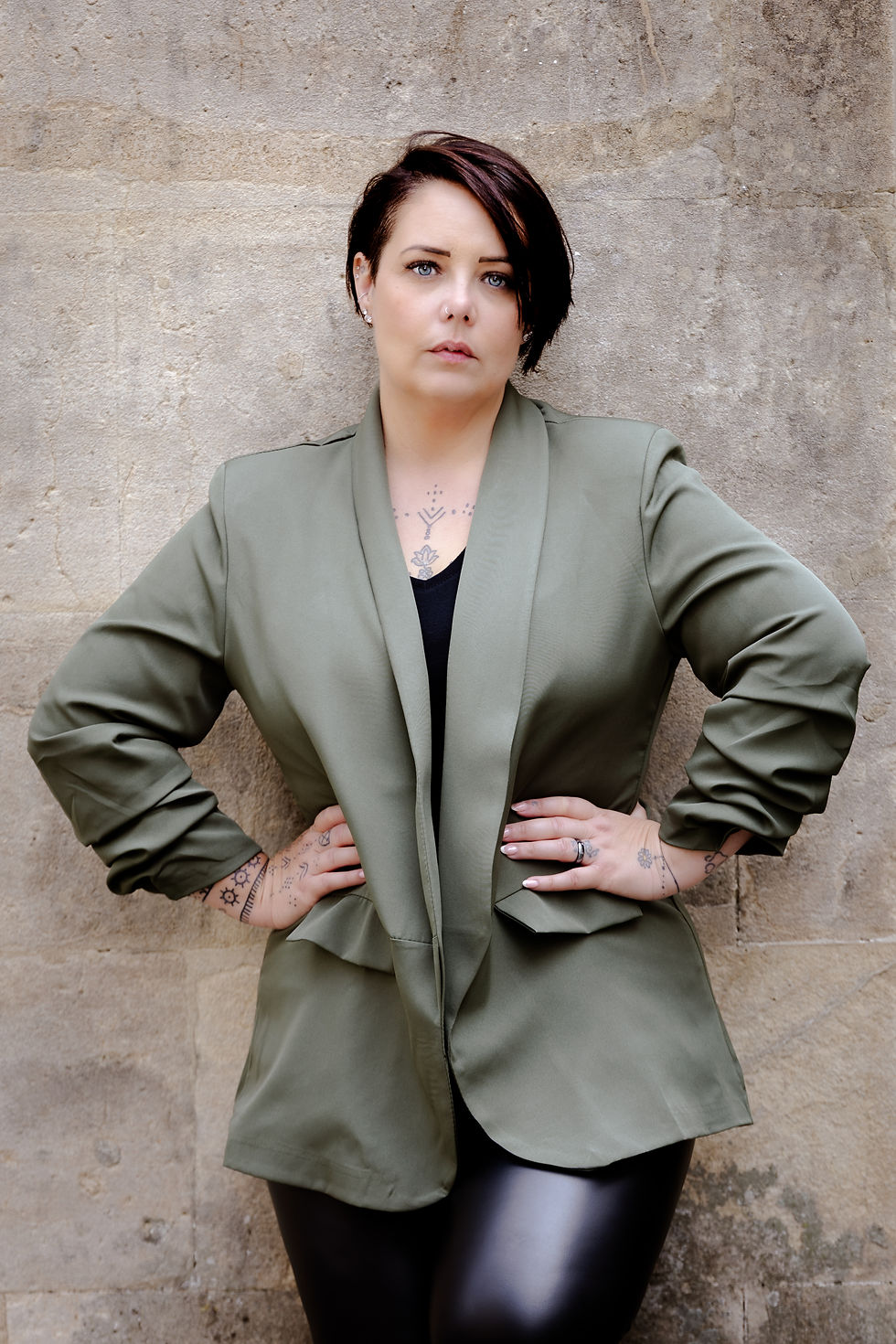Learning to Listen to Your Intuition: A Practical Guide to Hearing What You Already Know
- Michaela Pay

- Oct 1, 2025
- 5 min read
You’ve heard it a thousand times: “Trust your intuition.” “Listen to your gut.” “Follow your inner knowing.”
Great advice. Completely useless if you don’t know *how.*
Because here’s the truth: most people don’t actually know what their intuition sounds like. They’ve spent so long listening to logic, fear, other people’s opinions, and what they “should” do that the voice of their intuition has been drowned out by noise.
But it’s still there. It’s always been there. You just need to learn how to hear it again.
The Problem: You Think You Can’t Hear It
Most people tell me they don’t have intuition. Or that theirs doesn’t work. Or that they’re “not intuitive” like other people.
That’s like saying you don’t have a heartbeat because you haven’t checked your pulse lately.
You have intuition. You’ve always had it. You’ve just forgotten how to recognize it.
Why? Because you’ve been trained to ignore it.
You were taught that logic is more trustworthy. That feelings aren’t facts. That you need proof before you can move. That “I just know” isn’t good enough.
So you stopped listening. And over time, the voice got quieter. Not because it left, but because you learned to tune it out.
The good news? You can learn to tune back in.
What Intuition Actually Feels Like
First, let’s clear up what intuition is *not.*
It’s not a booming voice from the sky. It’s not always dramatic or obvious. It’s not going to send you a sign with flashing neon lights (though sometimes it does).
Intuition is quiet. Steady. Certain.
It often shows up as:
A knowing without explanation. You just know something is right or wrong, but you can’t articulate why. There’s no logical reason. You just *know.*
A body sensation. A tightness in your chest. A pit in your stomach. A sense of expansion or contraction. Your body knows before your brain catches up.
A whisper, not a shout. It’s the quiet voice underneath all the loud ones. It doesn’t argue with you. It just states the truth and waits.
A pull toward or away from something. An unexplainable draw toward a person, place, or decision. Or a resistance that has nothing to do with fear, just a clear “no.”
Information that arrives fully formed. An answer that just appears in your mind, complete. You didn’t think your way to it. It just landed.
A sense of peace, even when the decision is hard. Intuition doesn’t always feel comfortable, but it feels *right.* Even if it scares you.
That’s intuition. And you’ve felt it before. You’ve just been calling it something else.
Or ignoring it entirely.
Why You Can’t Hear It (And What to Do About It)
There are a few things that make intuition hard to hear:
1. You’re too loud.
Your mind is constantly running. Thinking, analyzing, planning, worrying. There’s no space for intuition to come through because you’ve filled every gap with noise.
What to do: Create silence. Not just external silence but internal silence. Meditation helps. So does walking without your phone. Staring out the window. Sitting in stillness without needing to fill it. Even five minutes of quiet can create enough space for intuition to speak.2. You’re confusing fear with intuition.
Fear is loud. It catastrophizes. It tells you all the reasons something will go wrong. It’s frantic and urgent and exhausting.
Intuition is calm. It doesn’t panic. It might tell you something scary, but it does so with clarity, not chaos.
What to do: Ask yourself: "Is this voice trying to protect me from danger, or protect me from discomfort?" Fear keeps you safe. Intuition keeps you aligned. Learn the difference.
3. You’re asking the wrong question.
When you ask, “What should I do?” your brain takes over. It starts problem-solving. It pulls up past data, other people’s advice, what’s worked before.
But intuition doesn’t answer “should” questions. It answers *truth* questions.
What to do: Instead of asking “What should I do?” ask:
- “What feels true?”
- “What do I already know?”
- “What am I being guided toward?”
- “If I trusted myself completely, what would I do?”
Those questions bypass logic and go straight to knowing.
4. You’re looking for permission.
You’re hoping intuition will tell you what you want to hear. Or you’re waiting for it to give you a “safe” answer. But intuition doesn’t care about safe. It cares about truth.
What to do: Get honest. Are you asking for guidance, or are you asking for validation? Be willing to receive an answer you don’t like. That’s when you know you’re really listening.
5. You don’t trust it.
You hear it, but you don’t act on it. So over time, the voice gets quieter because you’ve proven you won’t listen anyway.
What to do: Start small. Practice with low-stakes decisions. Which route to take home. What to eat for lunch. Who to text. Listen to the quiet knowing and follow it. The more you act on it, the louder it gets.
How to Strengthen Your Intuition
Intuition is like a muscle. The more you use it, the stronger it gets.
Practice daily check-ins. Before making any decision, pause. Get quiet. Ask, “What does my intuition say?” Don’t overthink it. Just notice what comes up first.
Track your hits. Write down when you had a gut feeling and what happened. You’ll start to see patterns. You’ll realise you were right more often than you thought.
Notice your body. Your body is always giving you information. Tension, ease, contraction, expansion. Start paying attention. What does “yes” feel like in your body? What does “no” feel like? The more you tune in, the clearer the signals become.
Stop asking everyone else. Every time you ask for advice, you’re prioritising external voices over your internal knowing. If you already know the answer, stop seeking validation. Trust it.
Act on it - especially when it’s uncomfortable. The fastest way to strengthen intuition is to follow it. Even when it’s scary. Even when it doesn’t make sense. The more you honour it, the louder it becomes.
Let go of needing to understand it. Intuition doesn’t always come with an explanation. Sometimes you just know. That’s enough. You don’t need to justify it, explain it, or understand it. Just trust it.
The Difference Between Intuition and Everything Else
Here’s how you can tell if it’s intuition:
Intuition is calm. Fear is frantic.
Intuition is clear. Doubt is confused.
Intuition is certain. Logic is calculating.
Intuition is quiet. Ego is loud.
Intuition feels like truth. Wishful thinking feels like hope.
When you hear your intuition, you *know*. There’s no second-guessing. There’s no “but what if?” There’s just clarity.
And if you’re not sure? Get quiet and ask again. The answer is always there. You just have to stop talking long enough to hear it.
What Happens When You Start Listening
Everything changes.
You stop second-guessing. You stop needing permission. You stop waiting for proof.
You make decisions faster because you know what’s true.
You waste less time on things that aren’t aligned because you can feel the misalignment immediately.
You start trusting yourself in a way you never have before.
Your business grows because you’re making decisions from clarity, not confusion.
Your life flows because you’re finally moving in the direction you’re meant to go.
And the voice? The voice gets louder. Clearer. Easier to hear.
Not because it changed. Because *you* did.
The Invitation
Your intuition has been trying to guide you your entire life.
It’s told you when something was off. When someone wasn’t trustworthy. When an opportunity was yours. When it was time to leave. When it was time to stay.
You’ve heard it. You’ve just been afraid to trust it.
But what if you did? What if you stopped overriding it with logic? What if you let it lead?
You don’t need to be more intuitive. You just need to start listening to the intuition you already have.
It’s there. Right now. Waiting for you to get quiet enough to hear it.
So get quiet.
Ask the question.
And trust what comes.
That’s all it takes.





Comments